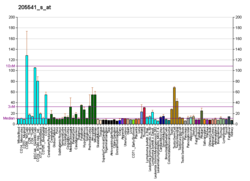| GSPT2 | |||||||||||||||||||||||||||||||||||||||||||||||||||
|---|---|---|---|---|---|---|---|---|---|---|---|---|---|---|---|---|---|---|---|---|---|---|---|---|---|---|---|---|---|---|---|---|---|---|---|---|---|---|---|---|---|---|---|---|---|---|---|---|---|---|---|
| |||||||||||||||||||||||||||||||||||||||||||||||||||
| Identifiers | |||||||||||||||||||||||||||||||||||||||||||||||||||
| Aliases | GSPT2 , ERF3B, GST2, G1 to S phase transition 2 | ||||||||||||||||||||||||||||||||||||||||||||||||||
| External IDs | OMIM: 300418; MGI: 1316727; HomoloGene: 99786; GeneCards: GSPT2; OMA:GSPT2 - orthologs | ||||||||||||||||||||||||||||||||||||||||||||||||||
| |||||||||||||||||||||||||||||||||||||||||||||||||||
| |||||||||||||||||||||||||||||||||||||||||||||||||||
| |||||||||||||||||||||||||||||||||||||||||||||||||||
| |||||||||||||||||||||||||||||||||||||||||||||||||||
| |||||||||||||||||||||||||||||||||||||||||||||||||||
| Wikidata | |||||||||||||||||||||||||||||||||||||||||||||||||||
| |||||||||||||||||||||||||||||||||||||||||||||||||||
Eukaryotic peptide chain release factor GTP-binding subunit ERF3B is an enzyme that in humans is encoded by the GSPT2 gene. [5] [6]
Contents
GSPT2 is closely related to GSPT1 (MIM 139259), a GTP-binding protein that plays an essential role at the G1- to S-phase transition of the cell cycle in yeast and human cells. GSPT1 is a positive regulator of translational accuracy and, in a binary complex with eRF1 (MIM 600285), functions as a polypeptide chain release factor.[supplied by OMIM] [6]




